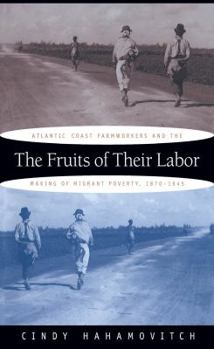The Fruits of Their Labor: Atlantic Coast Farmworkers and the Making of Migrant Poverty, 1870-1945
Select Format
Select Condition 
Book Overview
In 1933 Congress granted American laborers the right of collective bargaining, but farmworkers got no New Deal. Cindy Hahamovitch's pathbreaking account of migrant farmworkers along the Atlantic Coast... This description may be from another edition of this product.
Format:Paperback
Language:English
ISBN:0807846392
ISBN13:9780807846391
Release Date:April 1997
Publisher:University of North Carolina Press
Length:304 Pages
Weight:1.15 lbs.
Dimensions:0.8" x 6.2" x 9.2"
Customer Reviews
1 rating
Raw Deal
Published by Thriftbooks.com User , 16 years ago
Raw Deal Once in a while you read a book chock full of information you didn't know that you didn't know, or more importantly that you didn't know you needed to know. "The Fruits of Their Labor," by Cindy Hahamovitch, is such a book. The subtitle - Atlantic Coast Farmworkers and the Making of Migrant Poverty, 1870-1945 - only hints at the breadth of the subject matter, which stretches to include an economic and social history of agriculture in states from Maine to Florida and the Deep South. Though the author traces the changes in farming and truck-gardening that resulted from the partial mechanization of the 19th and early 20th Centuries, the focus of the book is on the conversion of traditional year-round farm-hands into seasonal laborers, and thus to the lowest-on-the-totem-pole migrants whose welfare was of minimal interest to ever-larger farm businessmen. More than half of the book deals with the twelve years of the New Deal and the Second World War, revealing how ineffective the "reformers" were in the face of opposition from racists and conservatives of both parties. It's no surprise to learn that FDR threw farm labor to the wolves, excluding it from the benefits of collective bargaining. Likewise, it's hardly shocking to realize how little understanding of rural realities the urban reformers of the era were, in their hopes that paternalism and a little health education would restore the agrarian paradise envisioned by Tom Jefferson. The value of this book comes from observing the mechanisms of interest groups - owners, to be blunt - in turning the efforts of government at all levels to the service of their selfish interests. It's also quite astonishing to observe how capitalistic farm-owners and government at all levels colluded, first in the callous exploitation of recent immigrants from Italy and then in the cultivation of the harvest of easily manipulated "undocumented" workers from Mexico, the Caribbean, and Asia, which the same people are still hypocritically ranting against. And finally, at the broadest level, this text is a study of the malfunctional interaction of federal and state governments at cross purposes, with the worst outcomes invariably befalling the humblest citizens. I know something about the history of agriculture in the Far West, from the days of the Southern Pacific "Octopus" to the heroic struggles of Cesar Chavez and the UFW. I know it academically, but also personally. During my high school summers in California in the late 1950s, I was a "fruit picker" - trailer court white trash - with most of my earnings going to feed my family while my father blew his paychecks on another recent-model car. I picked string beans, hops, tomatoes, and prunes. It was filthy, fatiguing, and unhealthy work, and a source of shame when my classmates heard of it. The idea that bringing in the harvest is healthful and noble was and is cow flop; breathing dust and pesticides in the hot sun for ten or twelve hours a day is not a pleasa




